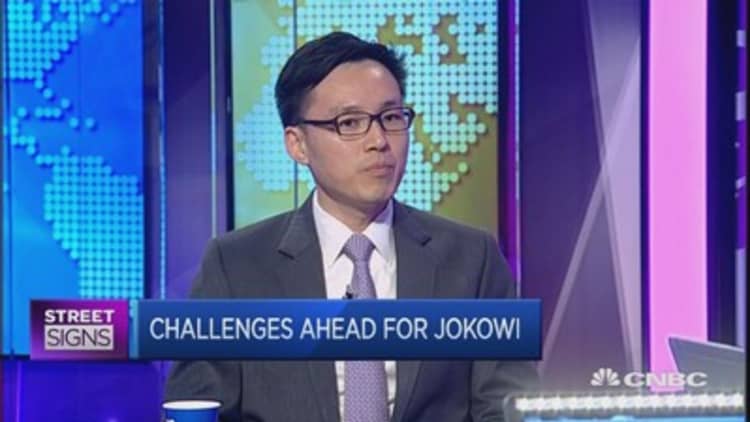Indonesia's economy stumbled in the first quarter, with growth coming in below expectations, amid signs the government's stimulation efforts may be falling short.
"The Indonesia economic outlook has rapidly turned from encouraging to problematic," Glenn Maguire, chief economist for Asia-Pacific at ANZ, said in a note Tuesday. "Government spending is leading the slowdown and must be activated efficiently and coincidentally to all the economy to base and for growth to recover," he said. "We do not have a high degree of confidence that sequential growth momentum has indeed bottomed in the first quarter."
Read More Chinese, Japanese investors are looking here
In the first quarter, the economy grew 4.7 percent from the year-ago period, below the 4.9 percent forecast in a Reuters poll and follows the 5 percent expansion in the fourth quarter. It was the slowest pace since 2009, during the Global Financial Crisis. On an on-quarter basis, gross domestic product (GDP) contracted 0.18 percent, missing a flat forecast in a Reuters poll.
The Indonesian rupiah weakened on the news, falling to a one-month low of 13,025 against the dollar.

Doubts have been growing over the ability of President Joko Widodo, known as Jokowi, to stimulate the economy as the country faces the prospect of a severe slowdown. Jokowi, is focusing the 2015 budget on a 14 percent increase in total revenue, a 30 percent rise in tax collection and a 60 percent increase in infrastructure spending. But market players are particularly concerned about a likely shortfall in the government's revenue collection, which might further hurt spending, especially on infrastructure projects key to Indonesia's growth.
Read More Indonesia bets on the taxman
"We are at the point where the market is slowly adjusting downward their expectation for how much Jokowi and his administration can achieve especially within the short run," Wellian Wiranto, an economist at OCBC, told CNBC Tuesday. "It's always a question of how much can the government achieve in tapping more of that [long-term] potential" from its large, young population and its abundant natural resources, he said.
Others see a potential for the economy to pick up the pace of growth.
For one, the government recently announced it plans to accelerate its spending plans after a slow start this year, Santitarn Sathirathai, an economist at Credit Suisse, said in a note Tuesday.
"From here on, the headwinds from last year's rate and fuel price hikes should gradually dissipate, allowing better growth momentum. At the same time, some pick up in investment realization in rupiah terms, led by construction sectors should provide some support," he said. But he still sees risks as some cutbacks in state spending will be necessary as government revenue will likely "surprise materially on the downside."
Santitarn is also concerned that fuel prices may rise ahead, hurting consumers' purchasing power and boosting inflation.
--Nyshka Chandran contributed to this article.


